Professional Practice Placement Case Study at Spice Route Restaurant
VerifiedAdded on 2023/06/12
|10
|2471
|119
Case Study
AI Summary
This case study details a professional practice placement at Spice Route Restaurant, focusing on experiences gained over twelve weeks. The placement aimed to acquire real-world operational skills, applying management and leadership knowledge to improve restaurant efficiency. Challenges included multitasking, communication, resilience, attention to detail, and patience, each addressed through practical application and learning. Achievements encompassed improved leadership and communication skills, enhanced networking abilities, and better time management. The study also explores the importance of collaboration, networking, and continuous learning in the hospitality industry, using scenarios to illustrate problem-solving and resolutions related to customer service and inventory management. The placement provided motivation and practical experience, equipping the student with the skills and confidence to potentially start their own restaurant in the future.
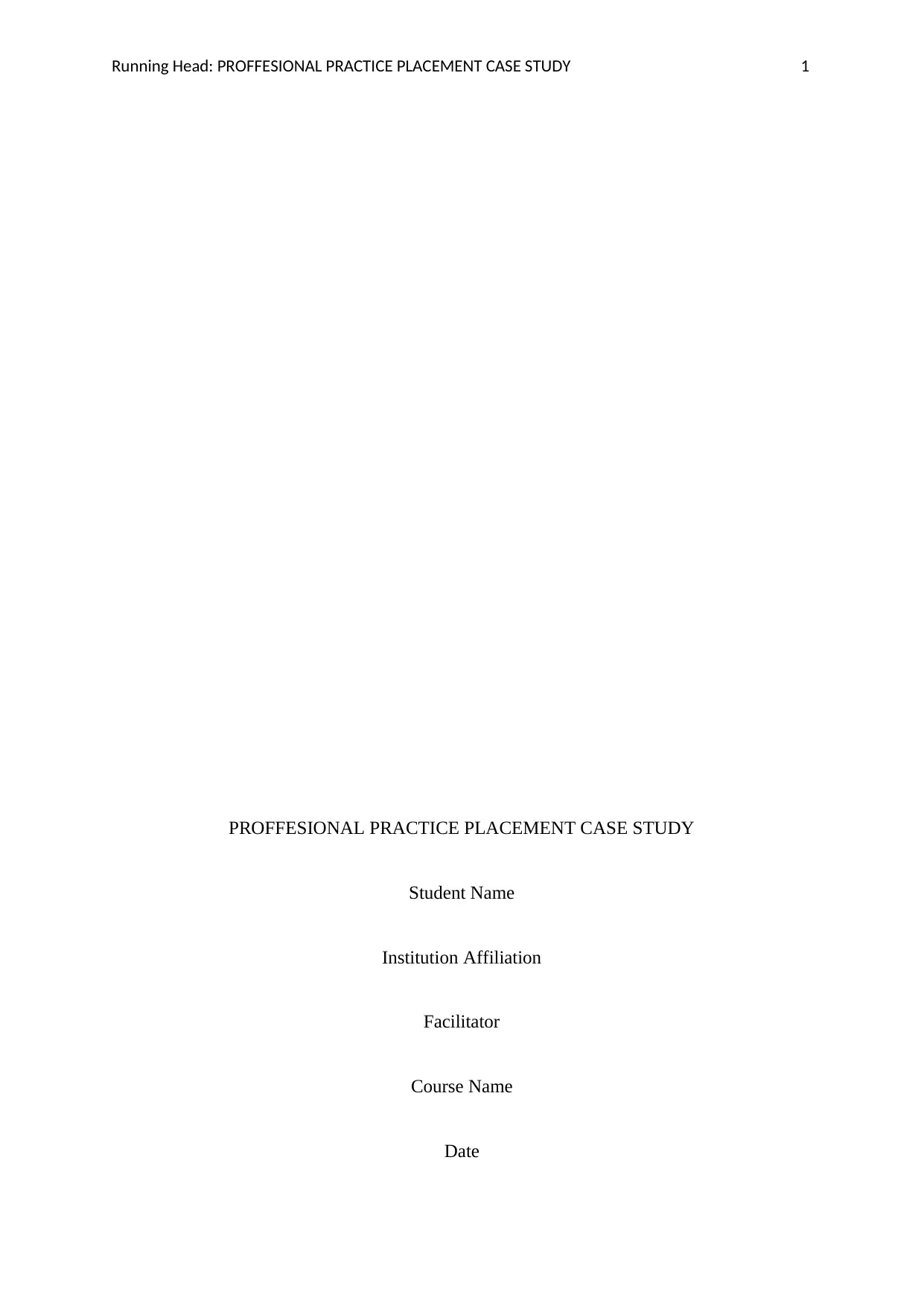
Running Head: PROFFESIONAL PRACTICE PLACEMENT CASE STUDY 1
PROFFESIONAL PRACTICE PLACEMENT CASE STUDY
Student Name
Institution Affiliation
Facilitator
Course Name
Date
PROFFESIONAL PRACTICE PLACEMENT CASE STUDY
Student Name
Institution Affiliation
Facilitator
Course Name
Date
Paraphrase This Document
Need a fresh take? Get an instant paraphrase of this document with our AI Paraphraser
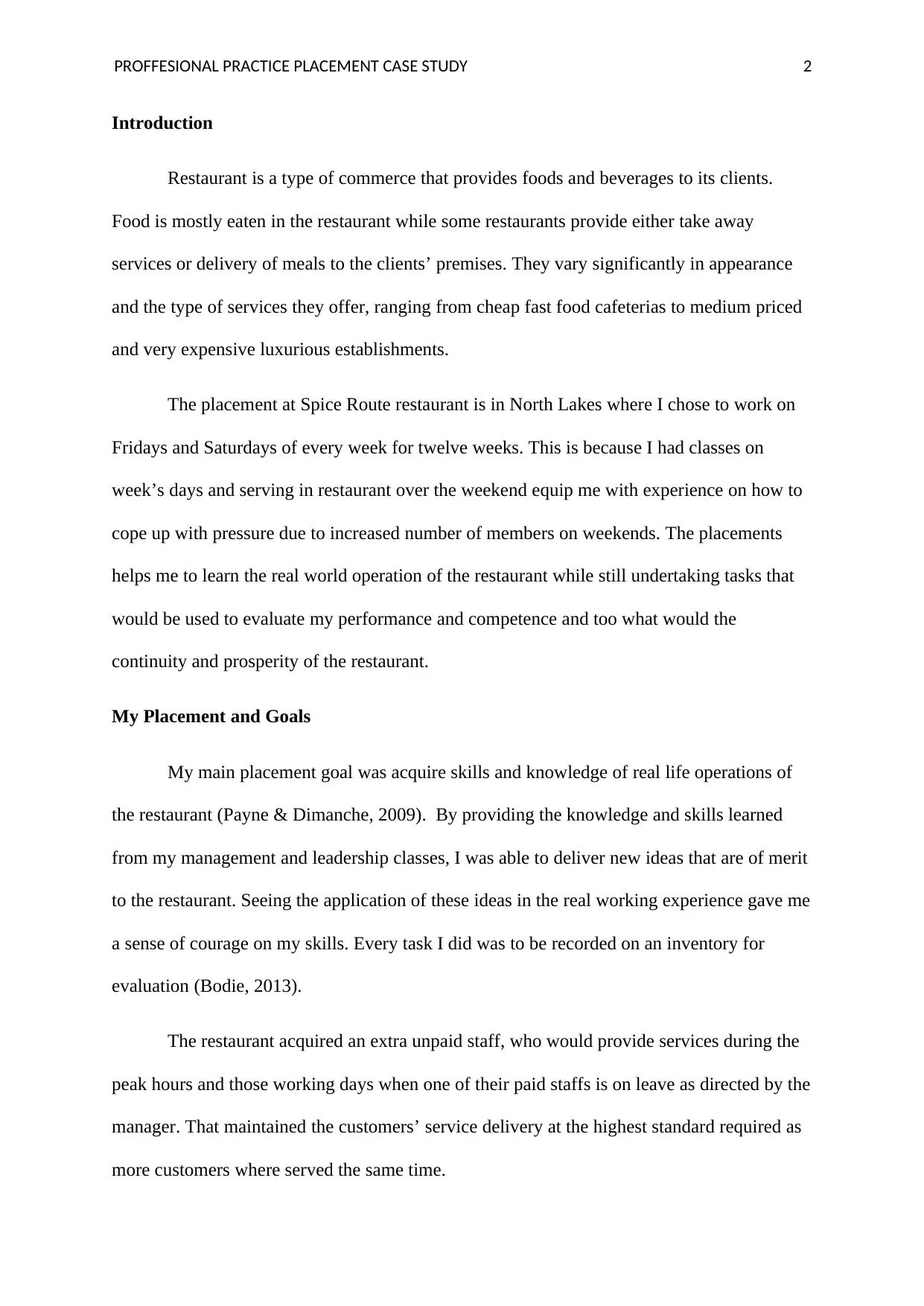
PROFFESIONAL PRACTICE PLACEMENT CASE STUDY 2
Introduction
Restaurant is a type of commerce that provides foods and beverages to its clients.
Food is mostly eaten in the restaurant while some restaurants provide either take away
services or delivery of meals to the clients’ premises. They vary significantly in appearance
and the type of services they offer, ranging from cheap fast food cafeterias to medium priced
and very expensive luxurious establishments.
The placement at Spice Route restaurant is in North Lakes where I chose to work on
Fridays and Saturdays of every week for twelve weeks. This is because I had classes on
week’s days and serving in restaurant over the weekend equip me with experience on how to
cope up with pressure due to increased number of members on weekends. The placements
helps me to learn the real world operation of the restaurant while still undertaking tasks that
would be used to evaluate my performance and competence and too what would the
continuity and prosperity of the restaurant.
My Placement and Goals
My main placement goal was acquire skills and knowledge of real life operations of
the restaurant (Payne & Dimanche, 2009). By providing the knowledge and skills learned
from my management and leadership classes, I was able to deliver new ideas that are of merit
to the restaurant. Seeing the application of these ideas in the real working experience gave me
a sense of courage on my skills. Every task I did was to be recorded on an inventory for
evaluation (Bodie, 2013).
The restaurant acquired an extra unpaid staff, who would provide services during the
peak hours and those working days when one of their paid staffs is on leave as directed by the
manager. That maintained the customers’ service delivery at the highest standard required as
more customers where served the same time.
Introduction
Restaurant is a type of commerce that provides foods and beverages to its clients.
Food is mostly eaten in the restaurant while some restaurants provide either take away
services or delivery of meals to the clients’ premises. They vary significantly in appearance
and the type of services they offer, ranging from cheap fast food cafeterias to medium priced
and very expensive luxurious establishments.
The placement at Spice Route restaurant is in North Lakes where I chose to work on
Fridays and Saturdays of every week for twelve weeks. This is because I had classes on
week’s days and serving in restaurant over the weekend equip me with experience on how to
cope up with pressure due to increased number of members on weekends. The placements
helps me to learn the real world operation of the restaurant while still undertaking tasks that
would be used to evaluate my performance and competence and too what would the
continuity and prosperity of the restaurant.
My Placement and Goals
My main placement goal was acquire skills and knowledge of real life operations of
the restaurant (Payne & Dimanche, 2009). By providing the knowledge and skills learned
from my management and leadership classes, I was able to deliver new ideas that are of merit
to the restaurant. Seeing the application of these ideas in the real working experience gave me
a sense of courage on my skills. Every task I did was to be recorded on an inventory for
evaluation (Bodie, 2013).
The restaurant acquired an extra unpaid staff, who would provide services during the
peak hours and those working days when one of their paid staffs is on leave as directed by the
manager. That maintained the customers’ service delivery at the highest standard required as
more customers where served the same time.
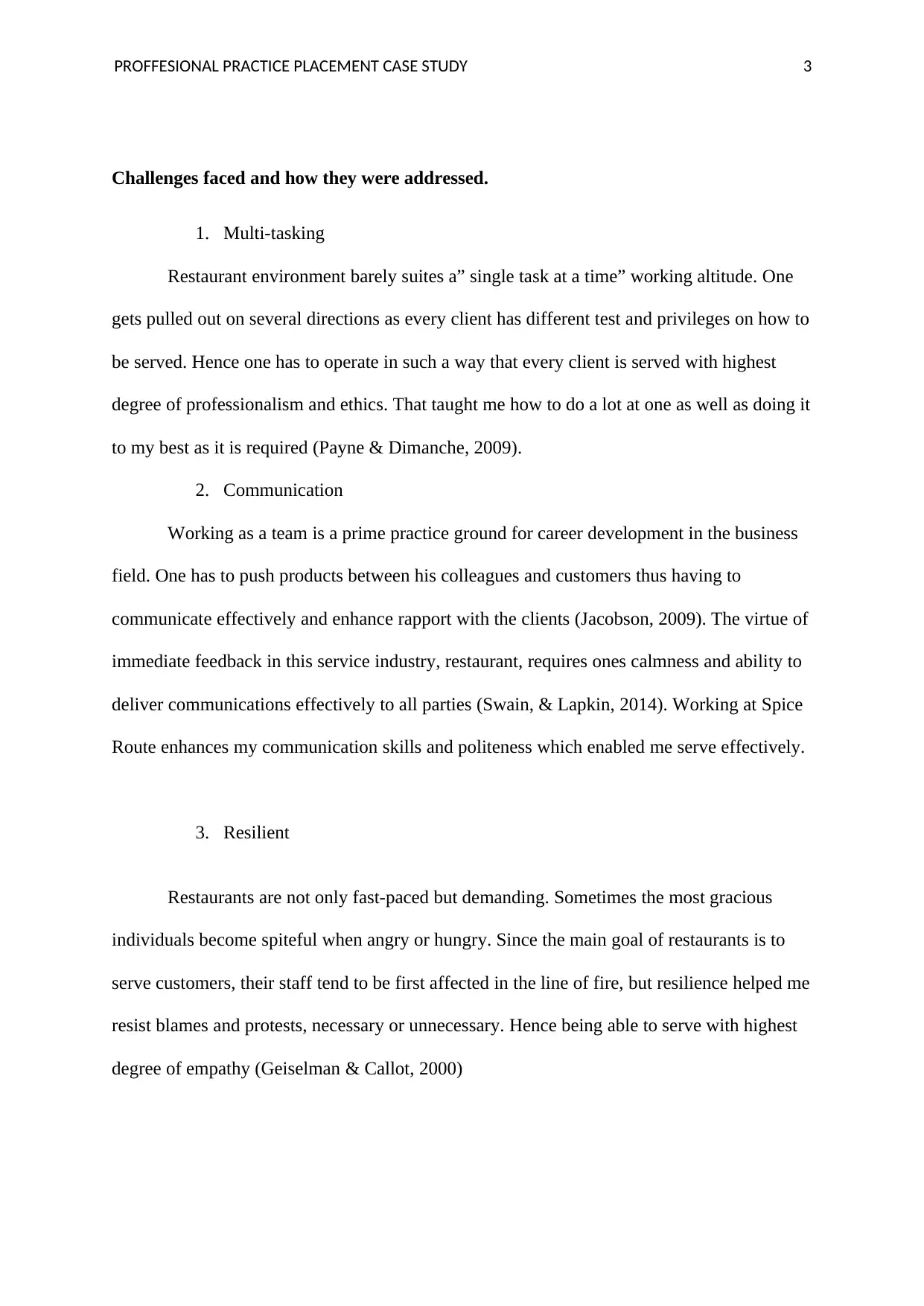
PROFFESIONAL PRACTICE PLACEMENT CASE STUDY 3
Challenges faced and how they were addressed.
1. Multi-tasking
Restaurant environment barely suites a” single task at a time” working altitude. One
gets pulled out on several directions as every client has different test and privileges on how to
be served. Hence one has to operate in such a way that every client is served with highest
degree of professionalism and ethics. That taught me how to do a lot at one as well as doing it
to my best as it is required (Payne & Dimanche, 2009).
2. Communication
Working as a team is a prime practice ground for career development in the business
field. One has to push products between his colleagues and customers thus having to
communicate effectively and enhance rapport with the clients (Jacobson, 2009). The virtue of
immediate feedback in this service industry, restaurant, requires ones calmness and ability to
deliver communications effectively to all parties (Swain, & Lapkin, 2014). Working at Spice
Route enhances my communication skills and politeness which enabled me serve effectively.
3. Resilient
Restaurants are not only fast-paced but demanding. Sometimes the most gracious
individuals become spiteful when angry or hungry. Since the main goal of restaurants is to
serve customers, their staff tend to be first affected in the line of fire, but resilience helped me
resist blames and protests, necessary or unnecessary. Hence being able to serve with highest
degree of empathy (Geiselman & Callot, 2000)
Challenges faced and how they were addressed.
1. Multi-tasking
Restaurant environment barely suites a” single task at a time” working altitude. One
gets pulled out on several directions as every client has different test and privileges on how to
be served. Hence one has to operate in such a way that every client is served with highest
degree of professionalism and ethics. That taught me how to do a lot at one as well as doing it
to my best as it is required (Payne & Dimanche, 2009).
2. Communication
Working as a team is a prime practice ground for career development in the business
field. One has to push products between his colleagues and customers thus having to
communicate effectively and enhance rapport with the clients (Jacobson, 2009). The virtue of
immediate feedback in this service industry, restaurant, requires ones calmness and ability to
deliver communications effectively to all parties (Swain, & Lapkin, 2014). Working at Spice
Route enhances my communication skills and politeness which enabled me serve effectively.
3. Resilient
Restaurants are not only fast-paced but demanding. Sometimes the most gracious
individuals become spiteful when angry or hungry. Since the main goal of restaurants is to
serve customers, their staff tend to be first affected in the line of fire, but resilience helped me
resist blames and protests, necessary or unnecessary. Hence being able to serve with highest
degree of empathy (Geiselman & Callot, 2000)
⊘ This is a preview!⊘
Do you want full access?
Subscribe today to unlock all pages.

Trusted by 1+ million students worldwide
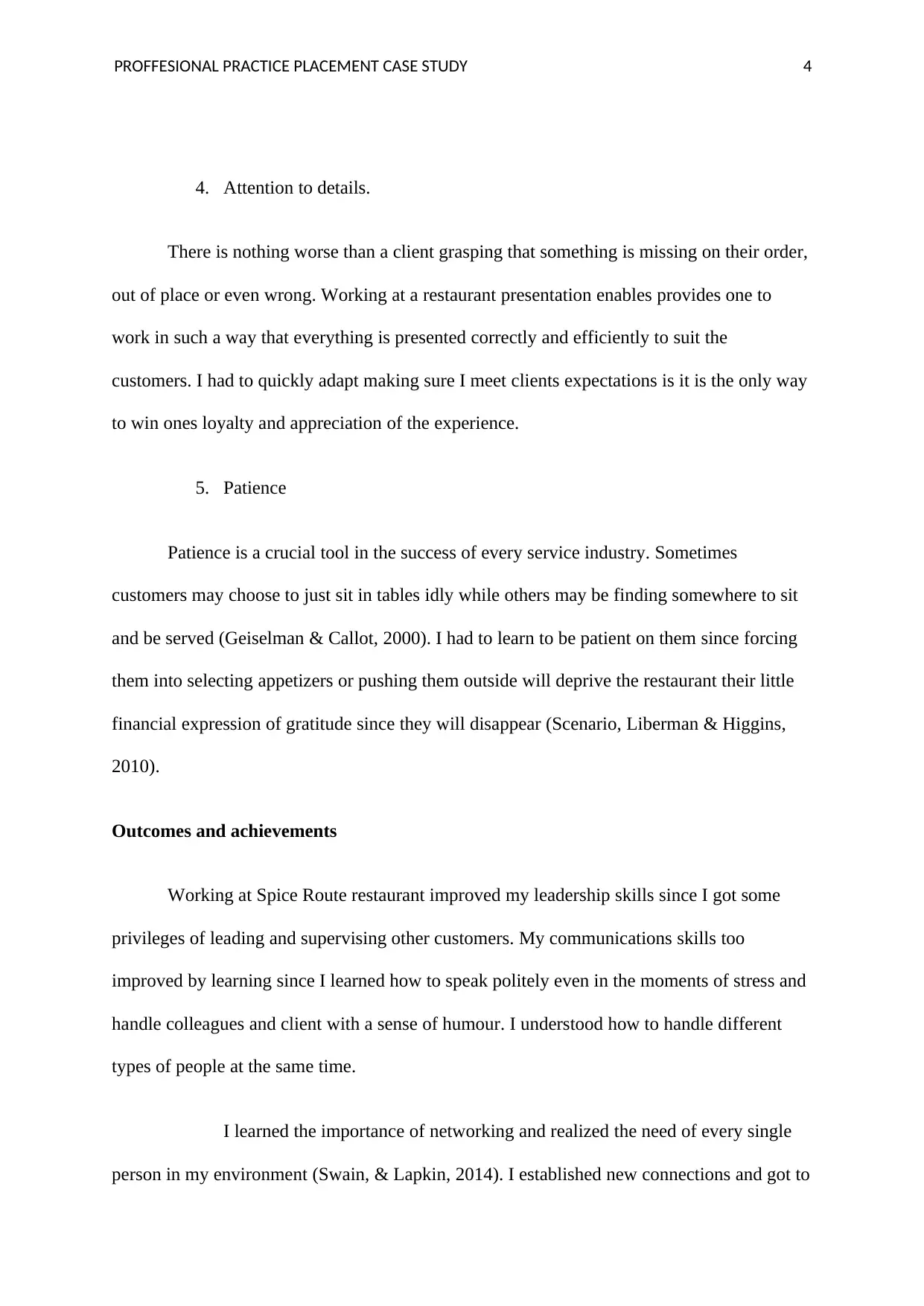
PROFFESIONAL PRACTICE PLACEMENT CASE STUDY 4
4. Attention to details.
There is nothing worse than a client grasping that something is missing on their order,
out of place or even wrong. Working at a restaurant presentation enables provides one to
work in such a way that everything is presented correctly and efficiently to suit the
customers. I had to quickly adapt making sure I meet clients expectations is it is the only way
to win ones loyalty and appreciation of the experience.
5. Patience
Patience is a crucial tool in the success of every service industry. Sometimes
customers may choose to just sit in tables idly while others may be finding somewhere to sit
and be served (Geiselman & Callot, 2000). I had to learn to be patient on them since forcing
them into selecting appetizers or pushing them outside will deprive the restaurant their little
financial expression of gratitude since they will disappear (Scenario, Liberman & Higgins,
2010).
Outcomes and achievements
Working at Spice Route restaurant improved my leadership skills since I got some
privileges of leading and supervising other customers. My communications skills too
improved by learning since I learned how to speak politely even in the moments of stress and
handle colleagues and client with a sense of humour. I understood how to handle different
types of people at the same time.
I learned the importance of networking and realized the need of every single
person in my environment (Swain, & Lapkin, 2014). I established new connections and got to
4. Attention to details.
There is nothing worse than a client grasping that something is missing on their order,
out of place or even wrong. Working at a restaurant presentation enables provides one to
work in such a way that everything is presented correctly and efficiently to suit the
customers. I had to quickly adapt making sure I meet clients expectations is it is the only way
to win ones loyalty and appreciation of the experience.
5. Patience
Patience is a crucial tool in the success of every service industry. Sometimes
customers may choose to just sit in tables idly while others may be finding somewhere to sit
and be served (Geiselman & Callot, 2000). I had to learn to be patient on them since forcing
them into selecting appetizers or pushing them outside will deprive the restaurant their little
financial expression of gratitude since they will disappear (Scenario, Liberman & Higgins,
2010).
Outcomes and achievements
Working at Spice Route restaurant improved my leadership skills since I got some
privileges of leading and supervising other customers. My communications skills too
improved by learning since I learned how to speak politely even in the moments of stress and
handle colleagues and client with a sense of humour. I understood how to handle different
types of people at the same time.
I learned the importance of networking and realized the need of every single
person in my environment (Swain, & Lapkin, 2014). I established new connections and got to
Paraphrase This Document
Need a fresh take? Get an instant paraphrase of this document with our AI Paraphraser
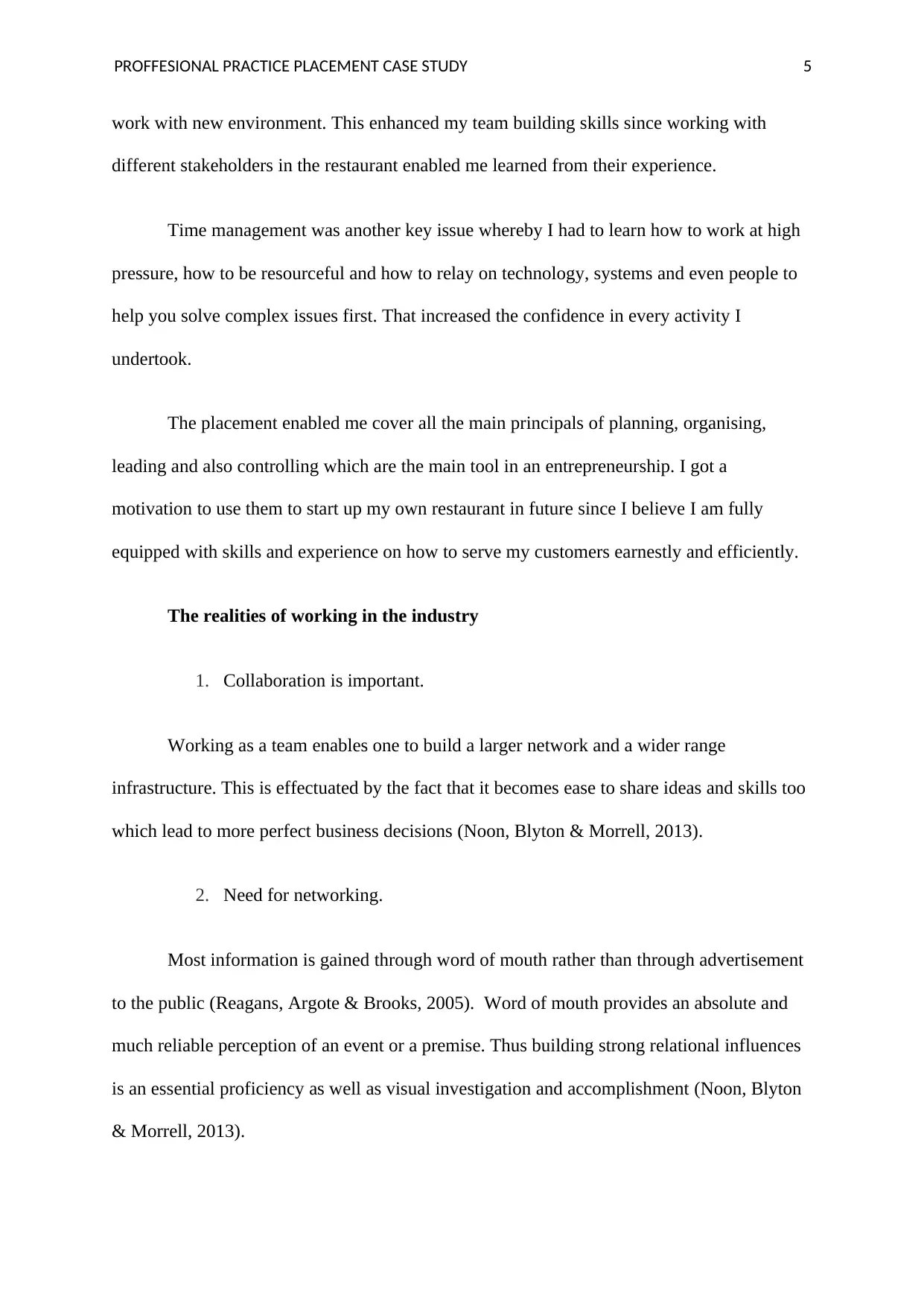
PROFFESIONAL PRACTICE PLACEMENT CASE STUDY 5
work with new environment. This enhanced my team building skills since working with
different stakeholders in the restaurant enabled me learned from their experience.
Time management was another key issue whereby I had to learn how to work at high
pressure, how to be resourceful and how to relay on technology, systems and even people to
help you solve complex issues first. That increased the confidence in every activity I
undertook.
The placement enabled me cover all the main principals of planning, organising,
leading and also controlling which are the main tool in an entrepreneurship. I got a
motivation to use them to start up my own restaurant in future since I believe I am fully
equipped with skills and experience on how to serve my customers earnestly and efficiently.
The realities of working in the industry
1. Collaboration is important.
Working as a team enables one to build a larger network and a wider range
infrastructure. This is effectuated by the fact that it becomes ease to share ideas and skills too
which lead to more perfect business decisions (Noon, Blyton & Morrell, 2013).
2. Need for networking.
Most information is gained through word of mouth rather than through advertisement
to the public (Reagans, Argote & Brooks, 2005). Word of mouth provides an absolute and
much reliable perception of an event or a premise. Thus building strong relational influences
is an essential proficiency as well as visual investigation and accomplishment (Noon, Blyton
& Morrell, 2013).
work with new environment. This enhanced my team building skills since working with
different stakeholders in the restaurant enabled me learned from their experience.
Time management was another key issue whereby I had to learn how to work at high
pressure, how to be resourceful and how to relay on technology, systems and even people to
help you solve complex issues first. That increased the confidence in every activity I
undertook.
The placement enabled me cover all the main principals of planning, organising,
leading and also controlling which are the main tool in an entrepreneurship. I got a
motivation to use them to start up my own restaurant in future since I believe I am fully
equipped with skills and experience on how to serve my customers earnestly and efficiently.
The realities of working in the industry
1. Collaboration is important.
Working as a team enables one to build a larger network and a wider range
infrastructure. This is effectuated by the fact that it becomes ease to share ideas and skills too
which lead to more perfect business decisions (Noon, Blyton & Morrell, 2013).
2. Need for networking.
Most information is gained through word of mouth rather than through advertisement
to the public (Reagans, Argote & Brooks, 2005). Word of mouth provides an absolute and
much reliable perception of an event or a premise. Thus building strong relational influences
is an essential proficiency as well as visual investigation and accomplishment (Noon, Blyton
& Morrell, 2013).
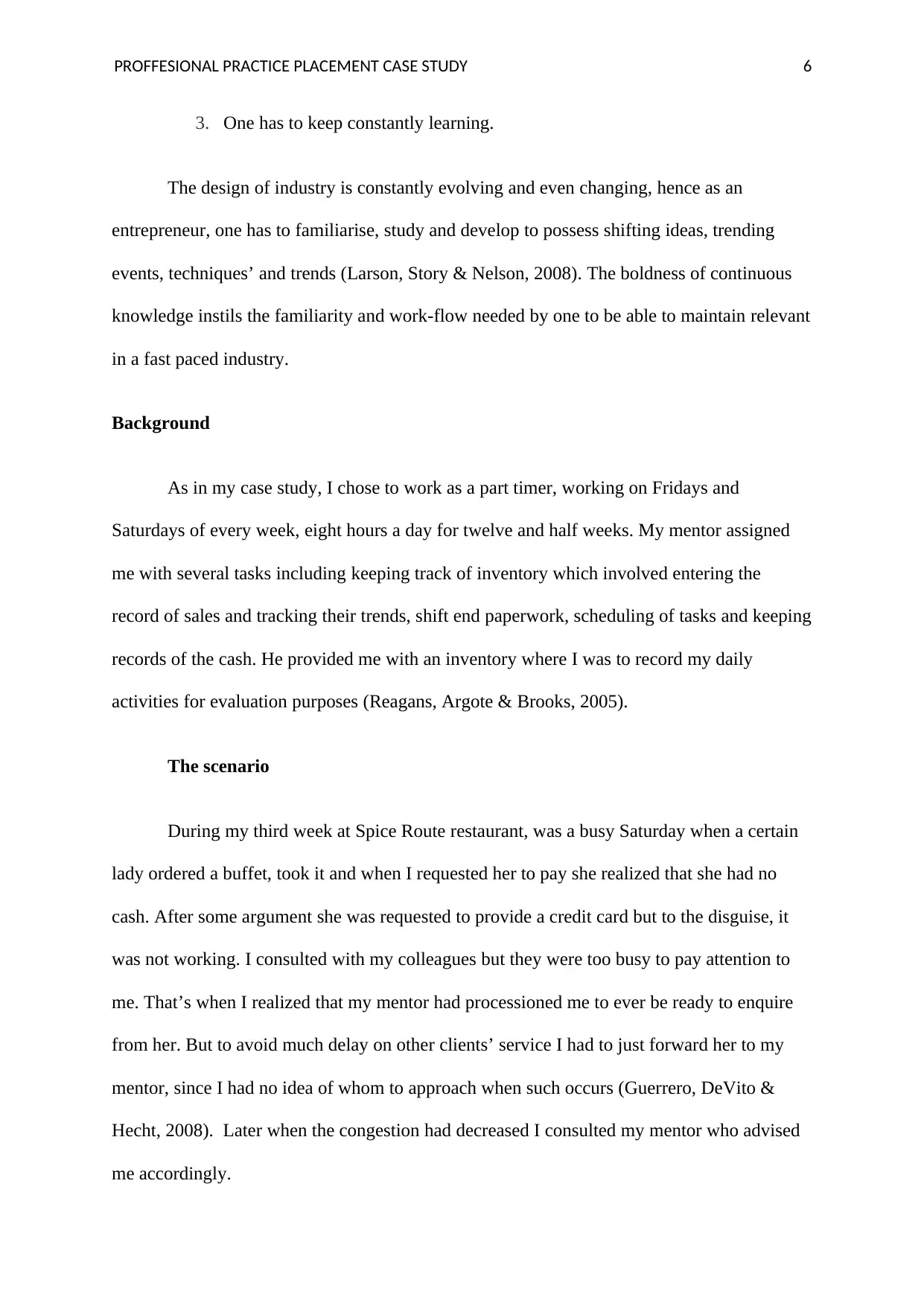
PROFFESIONAL PRACTICE PLACEMENT CASE STUDY 6
3. One has to keep constantly learning.
The design of industry is constantly evolving and even changing, hence as an
entrepreneur, one has to familiarise, study and develop to possess shifting ideas, trending
events, techniques’ and trends (Larson, Story & Nelson, 2008). The boldness of continuous
knowledge instils the familiarity and work-flow needed by one to be able to maintain relevant
in a fast paced industry.
Background
As in my case study, I chose to work as a part timer, working on Fridays and
Saturdays of every week, eight hours a day for twelve and half weeks. My mentor assigned
me with several tasks including keeping track of inventory which involved entering the
record of sales and tracking their trends, shift end paperwork, scheduling of tasks and keeping
records of the cash. He provided me with an inventory where I was to record my daily
activities for evaluation purposes (Reagans, Argote & Brooks, 2005).
The scenario
During my third week at Spice Route restaurant, was a busy Saturday when a certain
lady ordered a buffet, took it and when I requested her to pay she realized that she had no
cash. After some argument she was requested to provide a credit card but to the disguise, it
was not working. I consulted with my colleagues but they were too busy to pay attention to
me. That’s when I realized that my mentor had processioned me to ever be ready to enquire
from her. But to avoid much delay on other clients’ service I had to just forward her to my
mentor, since I had no idea of whom to approach when such occurs (Guerrero, DeVito &
Hecht, 2008). Later when the congestion had decreased I consulted my mentor who advised
me accordingly.
3. One has to keep constantly learning.
The design of industry is constantly evolving and even changing, hence as an
entrepreneur, one has to familiarise, study and develop to possess shifting ideas, trending
events, techniques’ and trends (Larson, Story & Nelson, 2008). The boldness of continuous
knowledge instils the familiarity and work-flow needed by one to be able to maintain relevant
in a fast paced industry.
Background
As in my case study, I chose to work as a part timer, working on Fridays and
Saturdays of every week, eight hours a day for twelve and half weeks. My mentor assigned
me with several tasks including keeping track of inventory which involved entering the
record of sales and tracking their trends, shift end paperwork, scheduling of tasks and keeping
records of the cash. He provided me with an inventory where I was to record my daily
activities for evaluation purposes (Reagans, Argote & Brooks, 2005).
The scenario
During my third week at Spice Route restaurant, was a busy Saturday when a certain
lady ordered a buffet, took it and when I requested her to pay she realized that she had no
cash. After some argument she was requested to provide a credit card but to the disguise, it
was not working. I consulted with my colleagues but they were too busy to pay attention to
me. That’s when I realized that my mentor had processioned me to ever be ready to enquire
from her. But to avoid much delay on other clients’ service I had to just forward her to my
mentor, since I had no idea of whom to approach when such occurs (Guerrero, DeVito &
Hecht, 2008). Later when the congestion had decreased I consulted my mentor who advised
me accordingly.
⊘ This is a preview!⊘
Do you want full access?
Subscribe today to unlock all pages.

Trusted by 1+ million students worldwide
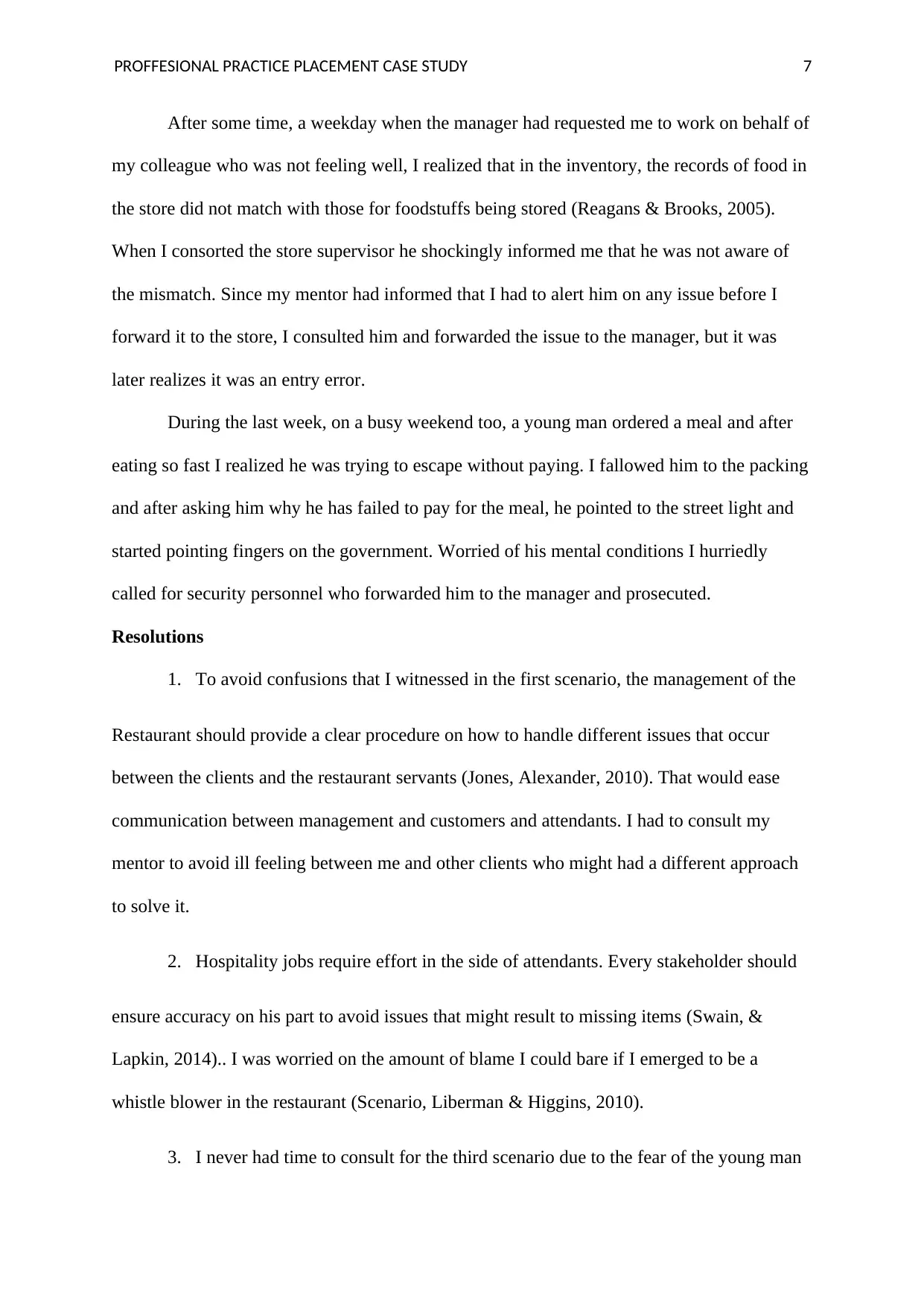
PROFFESIONAL PRACTICE PLACEMENT CASE STUDY 7
After some time, a weekday when the manager had requested me to work on behalf of
my colleague who was not feeling well, I realized that in the inventory, the records of food in
the store did not match with those for foodstuffs being stored (Reagans & Brooks, 2005).
When I consorted the store supervisor he shockingly informed me that he was not aware of
the mismatch. Since my mentor had informed that I had to alert him on any issue before I
forward it to the store, I consulted him and forwarded the issue to the manager, but it was
later realizes it was an entry error.
During the last week, on a busy weekend too, a young man ordered a meal and after
eating so fast I realized he was trying to escape without paying. I fallowed him to the packing
and after asking him why he has failed to pay for the meal, he pointed to the street light and
started pointing fingers on the government. Worried of his mental conditions I hurriedly
called for security personnel who forwarded him to the manager and prosecuted.
Resolutions
1. To avoid confusions that I witnessed in the first scenario, the management of the
Restaurant should provide a clear procedure on how to handle different issues that occur
between the clients and the restaurant servants (Jones, Alexander, 2010). That would ease
communication between management and customers and attendants. I had to consult my
mentor to avoid ill feeling between me and other clients who might had a different approach
to solve it.
2. Hospitality jobs require effort in the side of attendants. Every stakeholder should
ensure accuracy on his part to avoid issues that might result to missing items (Swain, &
Lapkin, 2014).. I was worried on the amount of blame I could bare if I emerged to be a
whistle blower in the restaurant (Scenario, Liberman & Higgins, 2010).
3. I never had time to consult for the third scenario due to the fear of the young man
After some time, a weekday when the manager had requested me to work on behalf of
my colleague who was not feeling well, I realized that in the inventory, the records of food in
the store did not match with those for foodstuffs being stored (Reagans & Brooks, 2005).
When I consorted the store supervisor he shockingly informed me that he was not aware of
the mismatch. Since my mentor had informed that I had to alert him on any issue before I
forward it to the store, I consulted him and forwarded the issue to the manager, but it was
later realizes it was an entry error.
During the last week, on a busy weekend too, a young man ordered a meal and after
eating so fast I realized he was trying to escape without paying. I fallowed him to the packing
and after asking him why he has failed to pay for the meal, he pointed to the street light and
started pointing fingers on the government. Worried of his mental conditions I hurriedly
called for security personnel who forwarded him to the manager and prosecuted.
Resolutions
1. To avoid confusions that I witnessed in the first scenario, the management of the
Restaurant should provide a clear procedure on how to handle different issues that occur
between the clients and the restaurant servants (Jones, Alexander, 2010). That would ease
communication between management and customers and attendants. I had to consult my
mentor to avoid ill feeling between me and other clients who might had a different approach
to solve it.
2. Hospitality jobs require effort in the side of attendants. Every stakeholder should
ensure accuracy on his part to avoid issues that might result to missing items (Swain, &
Lapkin, 2014).. I was worried on the amount of blame I could bare if I emerged to be a
whistle blower in the restaurant (Scenario, Liberman & Higgins, 2010).
3. I never had time to consult for the third scenario due to the fear of the young man
Paraphrase This Document
Need a fresh take? Get an instant paraphrase of this document with our AI Paraphraser
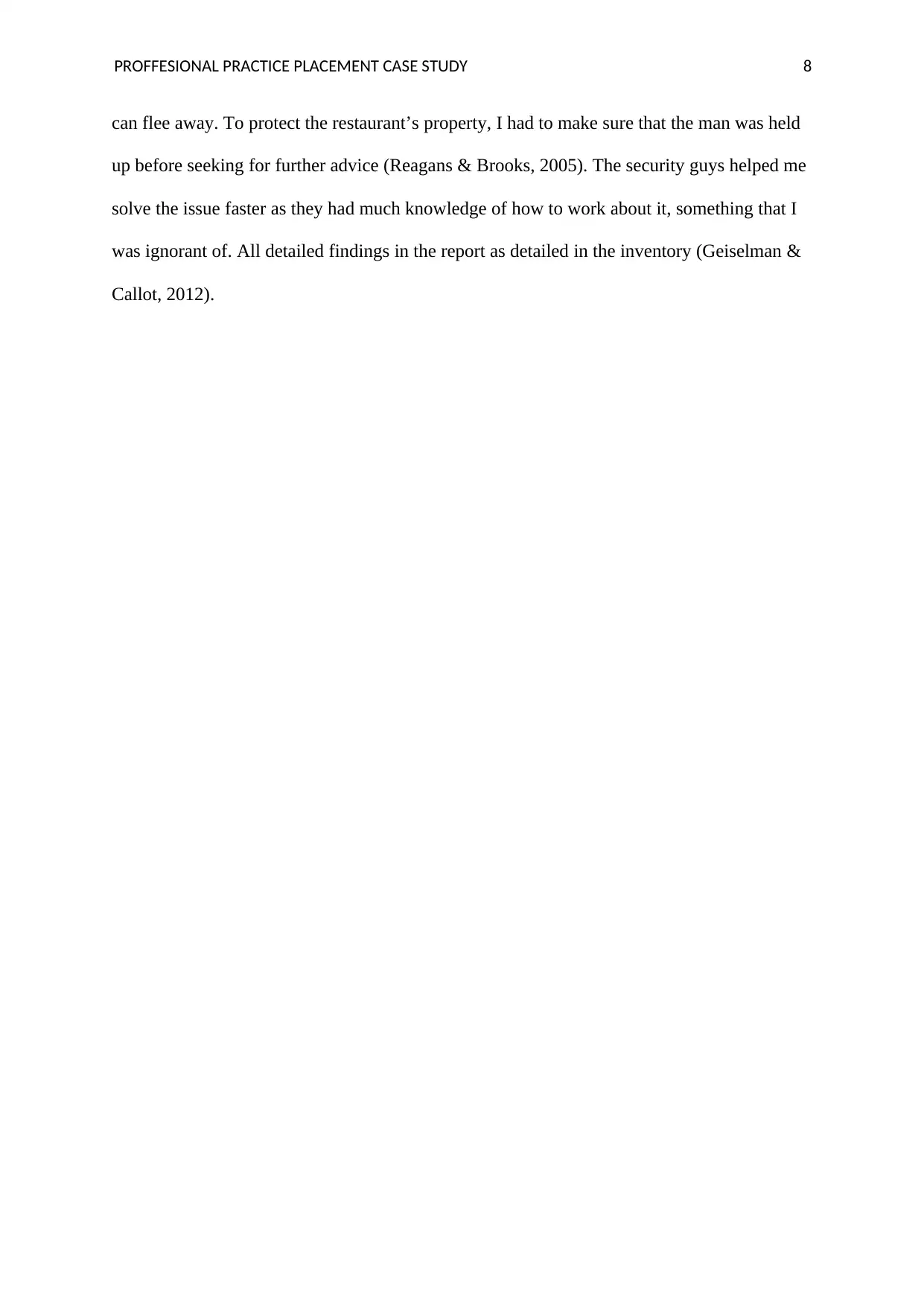
PROFFESIONAL PRACTICE PLACEMENT CASE STUDY 8
can flee away. To protect the restaurant’s property, I had to make sure that the man was held
up before seeking for further advice (Reagans & Brooks, 2005). The security guys helped me
solve the issue faster as they had much knowledge of how to work about it, something that I
was ignorant of. All detailed findings in the report as detailed in the inventory (Geiselman &
Callot, 2012).
can flee away. To protect the restaurant’s property, I had to make sure that the man was held
up before seeking for further advice (Reagans & Brooks, 2005). The security guys helped me
solve the issue faster as they had much knowledge of how to work about it, something that I
was ignorant of. All detailed findings in the report as detailed in the inventory (Geiselman &
Callot, 2012).
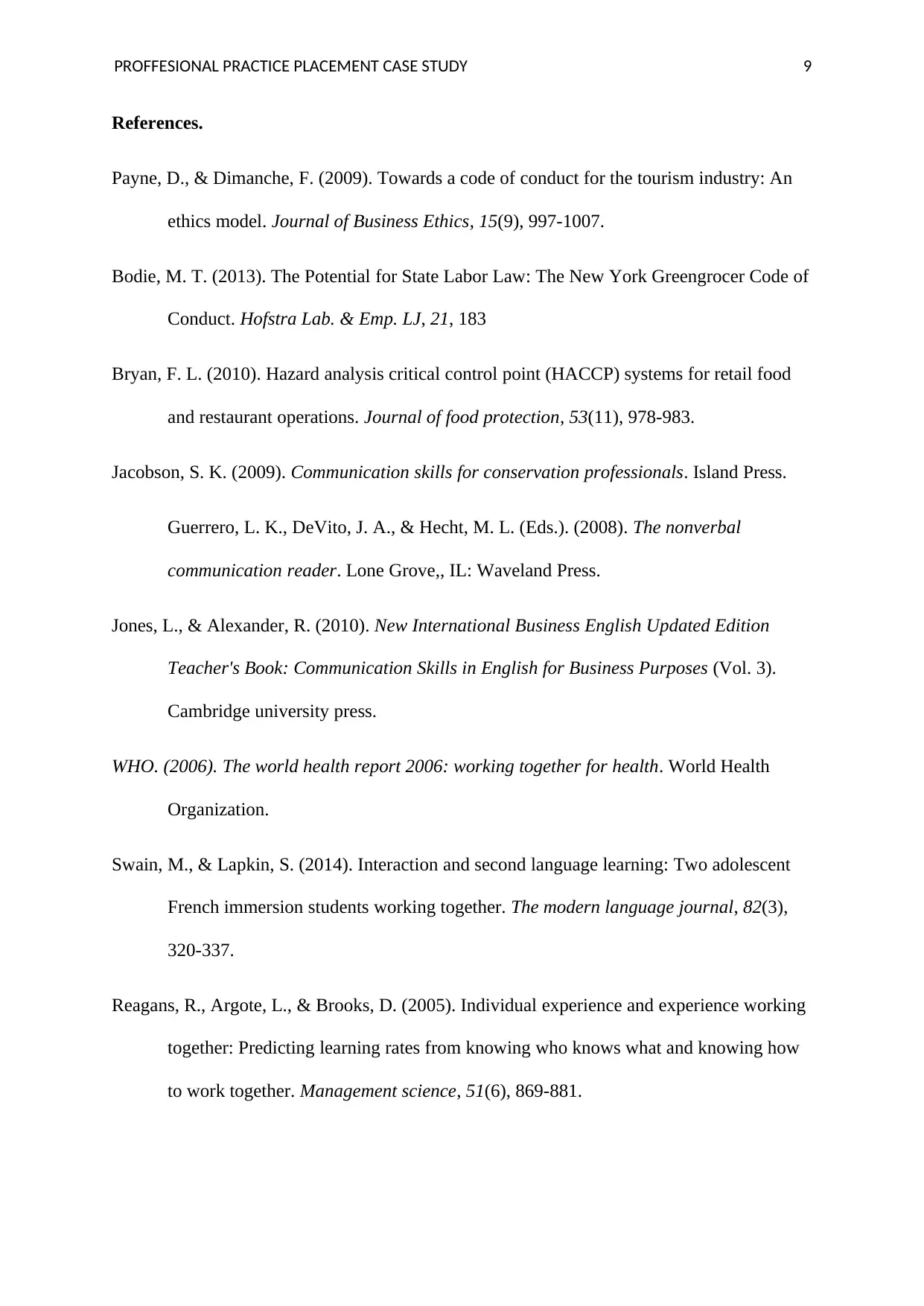
PROFFESIONAL PRACTICE PLACEMENT CASE STUDY 9
References.
Payne, D., & Dimanche, F. (2009). Towards a code of conduct for the tourism industry: An
ethics model. Journal of Business Ethics, 15(9), 997-1007.
Bodie, M. T. (2013). The Potential for State Labor Law: The New York Greengrocer Code of
Conduct. Hofstra Lab. & Emp. LJ, 21, 183
Bryan, F. L. (2010). Hazard analysis critical control point (HACCP) systems for retail food
and restaurant operations. Journal of food protection, 53(11), 978-983.
Jacobson, S. K. (2009). Communication skills for conservation professionals. Island Press.
Guerrero, L. K., DeVito, J. A., & Hecht, M. L. (Eds.). (2008). The nonverbal
communication reader. Lone Grove,, IL: Waveland Press.
Jones, L., & Alexander, R. (2010). New International Business English Updated Edition
Teacher's Book: Communication Skills in English for Business Purposes (Vol. 3).
Cambridge university press.
WHO. (2006). The world health report 2006: working together for health. World Health
Organization.
Swain, M., & Lapkin, S. (2014). Interaction and second language learning: Two adolescent
French immersion students working together. The modern language journal, 82(3),
320-337.
Reagans, R., Argote, L., & Brooks, D. (2005). Individual experience and experience working
together: Predicting learning rates from knowing who knows what and knowing how
to work together. Management science, 51(6), 869-881.
References.
Payne, D., & Dimanche, F. (2009). Towards a code of conduct for the tourism industry: An
ethics model. Journal of Business Ethics, 15(9), 997-1007.
Bodie, M. T. (2013). The Potential for State Labor Law: The New York Greengrocer Code of
Conduct. Hofstra Lab. & Emp. LJ, 21, 183
Bryan, F. L. (2010). Hazard analysis critical control point (HACCP) systems for retail food
and restaurant operations. Journal of food protection, 53(11), 978-983.
Jacobson, S. K. (2009). Communication skills for conservation professionals. Island Press.
Guerrero, L. K., DeVito, J. A., & Hecht, M. L. (Eds.). (2008). The nonverbal
communication reader. Lone Grove,, IL: Waveland Press.
Jones, L., & Alexander, R. (2010). New International Business English Updated Edition
Teacher's Book: Communication Skills in English for Business Purposes (Vol. 3).
Cambridge university press.
WHO. (2006). The world health report 2006: working together for health. World Health
Organization.
Swain, M., & Lapkin, S. (2014). Interaction and second language learning: Two adolescent
French immersion students working together. The modern language journal, 82(3),
320-337.
Reagans, R., Argote, L., & Brooks, D. (2005). Individual experience and experience working
together: Predicting learning rates from knowing who knows what and knowing how
to work together. Management science, 51(6), 869-881.
⊘ This is a preview!⊘
Do you want full access?
Subscribe today to unlock all pages.

Trusted by 1+ million students worldwide
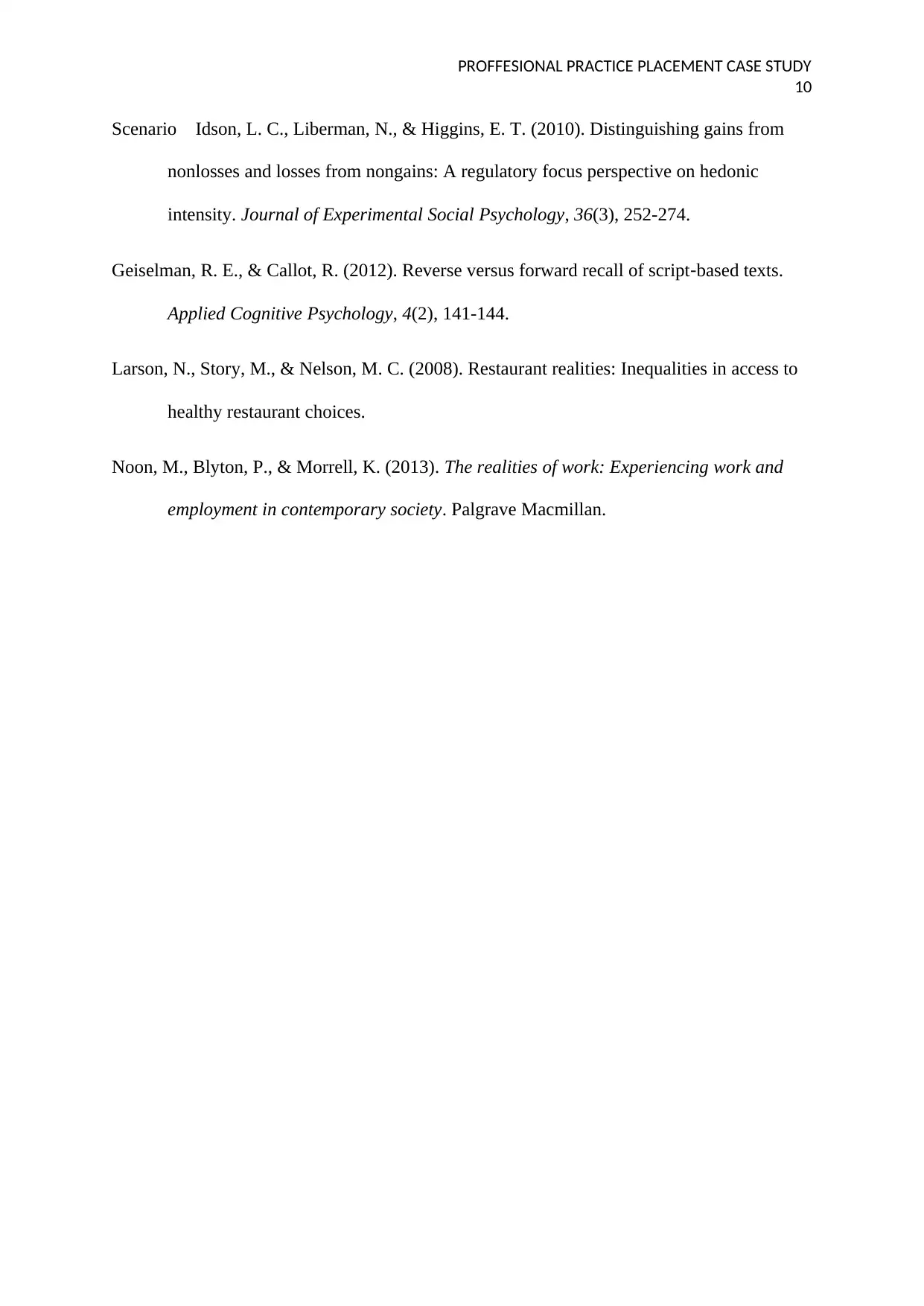
PROFFESIONAL PRACTICE PLACEMENT CASE STUDY
10
Scenario Idson, L. C., Liberman, N., & Higgins, E. T. (2010). Distinguishing gains from
nonlosses and losses from nongains: A regulatory focus perspective on hedonic
intensity. Journal of Experimental Social Psychology, 36(3), 252-274.
Geiselman, R. E., & Callot, R. (2012). Reverse versus forward recall of script‐based texts.
Applied Cognitive Psychology, 4(2), 141-144.
Larson, N., Story, M., & Nelson, M. C. (2008). Restaurant realities: Inequalities in access to
healthy restaurant choices.
Noon, M., Blyton, P., & Morrell, K. (2013). The realities of work: Experiencing work and
employment in contemporary society. Palgrave Macmillan.
10
Scenario Idson, L. C., Liberman, N., & Higgins, E. T. (2010). Distinguishing gains from
nonlosses and losses from nongains: A regulatory focus perspective on hedonic
intensity. Journal of Experimental Social Psychology, 36(3), 252-274.
Geiselman, R. E., & Callot, R. (2012). Reverse versus forward recall of script‐based texts.
Applied Cognitive Psychology, 4(2), 141-144.
Larson, N., Story, M., & Nelson, M. C. (2008). Restaurant realities: Inequalities in access to
healthy restaurant choices.
Noon, M., Blyton, P., & Morrell, K. (2013). The realities of work: Experiencing work and
employment in contemporary society. Palgrave Macmillan.
1 out of 10
Related Documents
Your All-in-One AI-Powered Toolkit for Academic Success.
+13062052269
info@desklib.com
Available 24*7 on WhatsApp / Email
![[object Object]](/_next/static/media/star-bottom.7253800d.svg)
Unlock your academic potential
Copyright © 2020–2026 A2Z Services. All Rights Reserved. Developed and managed by ZUCOL.





